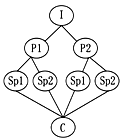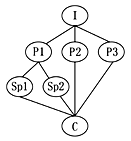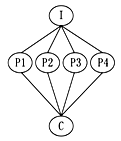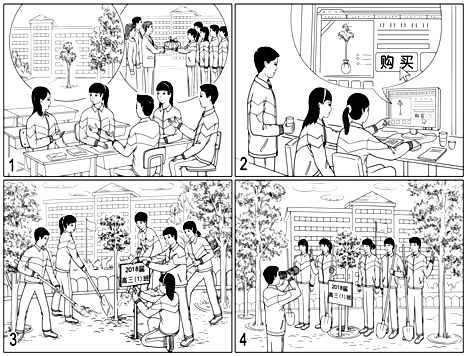—I ______ here for three years. It's so great to be back.
—That's ______ it has a unique dining environment and quite a few wonderful dishes.
All Quiet in a Darkened Library
After my mother died, my father, who was 75 at the time, began to regularly visit the local library in Epping. He loved going there1 he enjoyed reading different kinds of books, especially reading the newspapers on Saturdays. The library had a small area, where the soft carpet, folding chairs and lap desks 2a comfortable space for independent reading. My dad would sit there for hours. This particular wintery Saturday, at about 12 noon, after being there for two hours, my dad 3 that it was very quiet and darker than usual. He looked around, realizing that all the staff had left and he had been 4locked in.
My dad was a “panic merchant” at the best of times, so I can only 5 what he was like when this happened. The doors had been locked from the outside and he had no way 6 He must have felt completely at a 7 since he didn't know some 8 for handling this kind of crazy situation. My dad looked at the noticeboards to try to find a 9 phone number—a staff member or someone he could ring to help let him out—but without 10 So he rang the police station and they kindly got in touch with the head librarian.
The head librarian immediately rang my dad back at the library, and 11that she would be soon there. She tried to 12 him and even explained how he could make a coffee if he wished. This was very nice, but my dad was in too much of a “13” to do so.
Thankfully, the head librarian arrived 14 the hour and let my dad out. She apologized for the15it had caused my father and sent my father back home in person. We were very grateful, since she could easily have been16at having to come back to work. The next day my dad seemed to17 from this accident. He almost forgot all about the unpleasantness, and even found his experience quite 18.
I guess the entire staff now makes extra sure that the library is 19 before they leave. What's more, my dad has learned an important lesson by himself—never again became quite so20in his reading.
Dear Koko,
I've learned about you from my amazing teacher. I think it's fun that you can communicate with us humans by using the sign language. I've spent a lot of time watching you in different videos and love you from the bottom of my heart.
It's heartbreaking to learn about all of the cruel things done to gorillas (大猩猩). In Africa, for example, the killers use guns to kill your fellows for meat. They don't understand the influence their actions are having on gorillas. Another thing is the loss of gorillas' natural home, which is caused by the improved infrastructure such as building roads and airports. When we cut down trees, you become homeless. We take away your shelter and sources of food, leaving you with very little chance of survival.
Some of my classmates are writing to the relevant departments about these serious problems. Hopefully these letters will make a difference during your lifetime. Over the past three months, my class has been researching on gorillas, and I've learned so many things. For example, I've learned that you have a lot of feelings similar to mine and you are always so careful with everything you do. I think that you are really worth saving.
We've come up with many ideas to help you and your fellows. One of the best ideas is to communicate with the President of the World Bank and have him give more financial support to the organizations for gorillas. Another idea is to make public laws on the killers. I also think we need to keep educating people about gorillas.
I love writing to you and hope you can understand how important you've become to our class. Would it be too much to ask for a return letter?
Mike
The Handshake
I don't remember the exact date I met Marty for the first time. Like a lot of people who want to get through a checkout line, I found my thoughts on speed, nothing more. The line I was standing in wasn't moving as quickly as I wanted, and I glanced toward the cashier, who was receiving money from customers.
He was an old man in his sixties. I thought, well, it probably took him a little longer to get the jobs done. For the next few minutes I watched him. He greeted every customer before he began scanning the goods they were purchasing. Sure, his words were the usual, “How's it going?” But he did something different—he actually listened to people. Then he would respond to what they had said and talk with them briefly.
I thought it was strange, but I guessed I had grown accustomed to people asking me how I was doing simply out of a conversation without thinking. Usually, after a while, you don't give any thought to the question and just say something back quietly.
This old cashier seemed sincere about wanting to know how people were feeling. Meanwhile, the high-tech cash register rang up their purchases and he announced what they owed. When customers handed money to him, he pushed the appropriate keys, the cash drawer popped open, and he counted out their change.
Then magic happened.
He placed the change in his left hand, walked around the counter to the customers, and extended his right hand in an act of friendship. As their hands met, the old cashier looked the customers in the eyes. “I want to thank you for shopping here today,” he told them. “You have a great day. Bye-bye.” The looks on the faces of the customers were priceless.
Now it was my turn. I glanced down at the name tag on his red waistcoat, the kind experienced Wal-Mart cashier wore. It read, “Marty.”
Marty told me how much I owed and I handed him some money. The next thing I knew he was standing beside me, offering his right hand and holding my change in his left hand. His kind eyes locked onto mine. Smiling, and with a firm handshake…
No student of a foreign language needs to be told that grammar is complex. By changing the order of the words and by adding a range of auxiliary verbs (助动词) and suffixes (后缀), we can turn a statement into a question, state whether an action has taken place or is soon to take place, and perform many other word tricks to convey different meanings. However, the question which many language experts can't understand and explain is—who created grammar?
Some recent languages evolved due to the Atlantic slave trade. Since the slaves didn't know each other's languages, they developed a make-shift language called a pidgin. Pidgins are strings of words copied from the language of the landowners. They have little in the way of grammar, and speakers need to use too many words to make their meaning understood. Interestingly, however, all it takes for a pidgin to become a complex language is for a group of children to be exposed to it at the time when they learn their mother tongue. Slave children didn't simply copy the strings of words used by their elders. They adapted their words to create an expressive language. In this way complex grammar systems which come from pidgins were invented.
Further evidence can be seen in studying sign languages for the deaf. Sign languages are not simply a group of gestures; they use the same grammatical machinery that is found in spoken languages. The creation of one such language was documented quite recently in Nicaragua. Previously, although deaf children were taught speech and lip reading in the classrooms, in the playgrounds they began to invent their own sign system, using the gestures they used at home. It was basically a pidgin and there was no consistent grammar. However, a new system was born when children who joined the school later developed a quite different sign language. It was based on the signs of the older children, but it was shorter and easier to understand, and it had a large range of special use of grammar to clarify the meaning. What's more, they all used the signs in the same way. So the original pidgin was greatly improved.
Most experts believe that many of the languages were pidgins at first. They were initially used in different groups of people without standardization and gradually evolved into a widely accepted system. The English past tense—“ed” ending— may have evolved from the verb “do”. “It ended” may once have been “It end-did”. It seems that children have grammatical machinery in their brains. Their minds can serve to create logical and complex structures, even when there is no grammar present for them to copy.
A Competitive Sport
Cheerleading
Over the years, cheerleading has taken two primary forms: game-time cheerleading and competitive cheerleading. Game-time cheerleaders' main goal is to entertain the crowd and lead them with team cheers, which should not be considered a sport. However, competitive cheerleading is more than a form of entertainment. It is really a competitive sport.

Competitive cheerleading includes lots of physical activity. The majority of the teams require a certain level of tumbling (翻腾运动) ability. It's a very common thing for gymnasts, so it's easy for them to go into competitive cheerleading. Usually these cheerleaders integrate lots of their gymnastics experience including their jumps, tumbling, and overall energy. They also perform lifts and throws. This is where the “fliers” are thrown in the air, held by “bases” in different positions that require strength and working with other teammates.
Competitive cheerleading is also an activity that is governed by rules under which a winner can be declared. It is awarded points for technique, creativity and sharpness. Usually the more difficult the action is, the better the score is. That's why cheerleaders are trying to experience great difficulty in their performance.
Besides, there is also a strict rule of time. The whole performance has to be completed in less than three minutes and fifteen seconds, during which the cheerleaders are required to stay within a certain area. Any performance beyond the limit of time is invalid.
Another reason for the fact that competitive cheerleading is one of the hardest sports is that it has more reported injuries. According to some research, competitive cheerleading is the number one cause of serious sports injuries to women. Emergency room visits for it are five times the number than for any other sport, partially because cheerleaders don't use protective equipment. Smiling cheerleaders are thrown into the air and move down into the arms of the teammates, which may easily cause injuries. Generally, these injuries affect all areas of the body, including wrists, shoulders, ankles, head, and neck.
There can be no doubt that competitive cheerleading is a sport with professional skills. Hopefully, it will appear in the Olympics since cheerleaders are just as athletic and physically fit as those involved in the more accepted sports. It should be noted that it is a team sport and even the smallest mistake made by one teammate can bring the score of the entire team down. So without working together to achieve the goal, first place is out of reach.
I: Introduction P: Point Sp: Sub-point (次要点) C: Conclusion
 B .
B .  C .
C .  D .
D . 
Rich and Famous
Twenty years ago the most common ambition of American children was to be a teacher, followed by working in banking and finance, and then medicine. But today's situation is quite different.Instead they most commonly say they want to be a sports star, a pop star, or an actor—in other words, they hope to become a celebrity (名人).
According to experts, young people desire these jobs largely because of the wealth and the fame. Let's take athletes and singers as an example. Their careers are short-lived. Many athletes' best time only lasts a few years and singers can have a very limited career. The field that was once the focus of their lives becomes something they have little or no involvement in. As a result, they'll have a feeling of worthlessness and a lack of controlThe truth is quite simple: they have been so far removed from it for so long.
In spite of these disadvantages, there is greater ambition than ever among young people to achieve that status. They are not satisfied just making a living—they want to be rich and famous. Globally, more and more TV shows provide talent competitions where winners can achieve their goals in just a few weeks or monthsThey unrealistically believe that this lifestyle is easily obtained and leads to great satisfaction.
While many people argue that there is nothing wrong with having such ambitions, others feel that this trend will finally lead to dissatisfaction as more and more people are unable to reach their goals That means they ignore the simple fact that great effort is needed before success. As a result, many people won't realize their childhood dreams, which could have a negative effect on their happiness.
A. The younger generation don't favor these professions any more.
B. In many ways this has been brought about by the celebrity culture.
C. Unfortunately, they do not always have a positive effect on people's life.
D. Besides, it can be difficult for them to adapt back to a normal everyday life.
E. People no longer have a sense of satisfaction once their goals have been achieved.
F. This quick way of gaining wealth and fame creates a celebrity culture among people.
G. The reason is that they don't realize it takes talent and hard work to be rich and famous.
1)推荐他做一件事;
2)说明推荐的理由;
3)表达愿望。
注意:1)词数不少于50;
2)邮件的开头和结尾已给出,不计入总词数。
Dear Jim,
Yours,
Li Hua

A Special Present